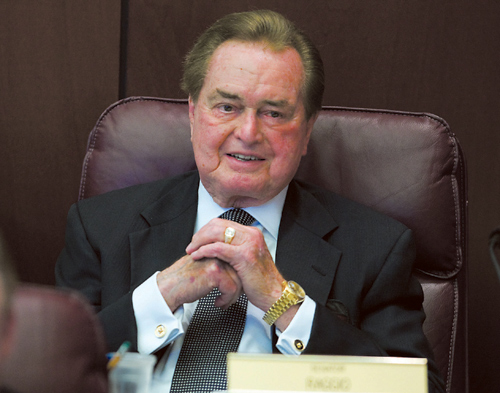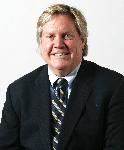Name game on ballot an iffy move
"Skip." "Butch." "FatJack."
They sound more like truck drivers in a bar brawl than politicians running for office.
But these are some of the ballot nicknames of candidates in smaller races statewide who were successful on Election Day.
Heroic monikers such as "Batman" and "Mr. Truth" fell short Tuesday night as well as unusual nicknames like Tuna and Metric.
Nevada state law allows the use of ballot nicknames if they are shorter than 10 letters and are accompanied by quotation marks. The name has to appear before the surname of the candidate and cannot indicate any political, economic, social or religious views.
But voters in this election made it clear they would not choose such candidates, said Mark Peplowski, a political science professor at the College of Southern Nevada.
"You create the brand, you take the name, you create the identity, and you sell it," Peplowski said. "When all you have to run on is your name, you have no reputation or record; you have to somehow establish what your name means, sell it and live with it."
Serious voters do not give credibility to candidates with nicknames because they don't tell you anything about the people running, he added.
"I think it's their only ability to draw attention to themselves and nothing else," Peplowski said. "It's just to get people to acknowledge them."
Successful candidates include longtime Nevada politician Richard "Tick" Segerblom; Searchlight's newest constable, Jack "FatJack" Cochran, who was uncontested; Andrew "Butch" Borasky, who was re-elected as a Nye County commissioner; and Richard "Skip" Daly, who won Assembly District 31 in Washoe County.
But candidates with nicknames running for Clark County treasurer, commissioner and state senator lost. A candidate for one Assembly district and another candidate for a rural water race in Washoe County also lost.
"If you're in a small town, it probably doesn't bother you as much," Peplowski said. "But if you have a small-town mentality in an urban environment, it's like, 'Hello, grow up. This isn't Mayberry.' "
In Nevada's 1992 U.S. Senate election, one candidate ran as "God Almighty," according to voter information in the "Political History of Nevada in 2006." That would not be allowed under revisions made to the law in 2003, not because it's 11 letters but because of its religious connotation.
Dan Schawbel is a Boston-based personal branding guru, who has helped celebrities and CEOs perfect their images. Schawbel said that although nicknames can be memorable and personable, using a moniker is short-term thinking.
"If you invest in your name, you can have that for life, they'll always be looking for you," he said. "It's all about the long term; how do you want to be remembered? Do you want to be remembered for a full name or some dumb nickname?"
Schawbel added that candidates who have common names could find using a nickname beneficial to draw attention to their campaigns.
"That way people can find them when they're looking for information," he said.
But Schawbel cautions not to take it too far.
"If you have a legitimate nickname, that doesn't make you look sloppy; it's easy to remember," he said. "It might help you put a human face on your campaign and allow people to connect with you."
-- Kristi Jourdan
Conservative Republican state senators didn't want longtime Sen. Bill Raggio, R-Reno, to lead their caucus, but they didn't mind taking his money for their campaigns.
Raggio, 84, stepped aside Monday as the Republicans' state Senate leader, a post he held since 1982, under pressure from conservatives who didn't like tax compromises he made in 2003 and 2009 nor his grudging endorsement of U.S. Sen. Harry Reid, D-Nev., over Republican challenger Sharron Angle. Raggio also vacated his position on the state Senate Finance Committee.
The caucus unanimously elected state Sen. Mike McGinness, R-Fallon, minority leader. State Sen. Barbara Cegavske, R-Las Vegas, was named assistant minority leader.
While conservatives made it clear they didn't cotton to Raggio's propensity to seek compromise with Democrats, they didn't mind accepting tens of thousands of dollars in contributions from his Senate Republican Leadership Fund in recent months, according to the fund's latest contribution and expense report.
In October, the fund recorded a $5,000 contribution to McGinness and a $10,000 contribution to Cegavske, who overcame being targeted by Democrats who viewed her as potentially vulnerable.
The fund also recorded $10,000 in contributions to Assemblyman Don Gustavson, R-Sparks, a newly elected state senator and a critic of Raggio's Reid endorsement.
GOP newcomers Elizabeth Halseth, who defeated Sen. Dennis Nolan of Las Vegas in the primary, and Michael Roberson, who beat incumbent state Sen. Joyce Woodhouse, D-Las Vegas, each received $5,000 from the fund. James Settelmeyer, a conservative assemblyman who won the state Senate seat vacated by Sen. Mark Amodei, R-Carson City, received $10,000.
In accepting money from the fund, the conservatives were accepting cash from donors who also supported Reid.
Contributions to Raggio's fund included $1,000 from Sig Rogich, a Republican political strategist who crossed party lines to support Reid's re-election, and $10,000 from MGM Resorts International. MGM Chairman and CEO Jim Murren was a vocal supporter of Reid's re-election. In addition to being part of the group Republicans for Reid, Murren starred in television ads supporting the U.S. senator's re-election.
-- Benjamin Spillman
Campaign signs cluttering the landscape are the last vestiges of the eventful election year, but soon they will vanish.
Candidates have 15 days after the election is over to remove them or face up to $1,000 in fines and six months in jail for a misdemeanor.
Clark County and Las Vegas city officials said Friday that they can't recall ever punishing candidates for failing to remove signs.
"They're very responsive," said Joe Boteilho, county code enforcement chief. "All we have to do is tell somebody, and they run out and grab them."
Candidates or the companies they hire to install signs have cooperated with code enforcement officers during the election season, Boteilho said. For instance, motorists complained that some signs were too close to a road and blocked their view of traffic as they tried to turn. The candidates moved the signs to their proper 10-foot setback, he said.
He foresees no problems in clearing out the signs. Usually if a sign lingers in a public spot, a resident placed it there and not a candidate, Boteilho said.
-- Scott Wyland
Contact reporter Kristi Jourdan at kjourdan @reviewjournal.com or 702-383-0279. Contact Benjamin Spillman at bspillman @reviewjournal.com or 702-477-3861. Contact reporter Scott Wyland at swyland @reviewjournal.com or 702-455-4519.
Political Eye blog



















